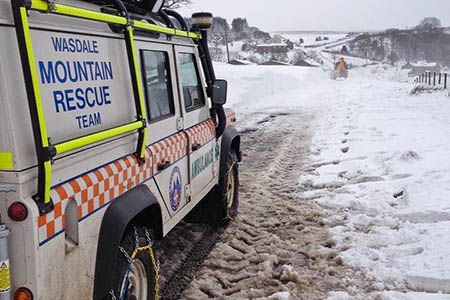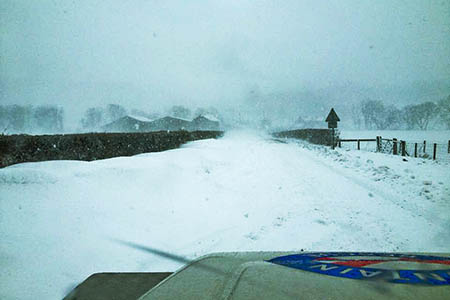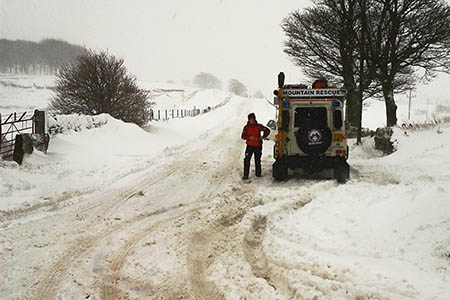
One of the Wasdale team's vehicles in action during the rescue of motorists in west Cumbria. Photo: Wasdale MRT
Severe winter weather is continuing to cause problems across swathes of northern England and the Midlands as numerous mountain rescue teams help stranded motorists and residents.
The Met Office has re-issued and extended its level-three cold weather action alert to health authorities for much of the coming week, warning that vulnerable patients are at risk and winter conditions may disrupt health services.
The level-three amber alert is one grade below a red alert that triggers a national emergency.
The warning is for the period from 3pm today until early on Thursday morning.
The Met Office, the Government’s official weather forecasters, said: “Cold easterly winds will persist through the coming week with bitterly cold conditions.
“With lying snow and partial snow melt during the day icy conditions are likely. Today’s light snow in central areas will die away, but a few mainly light wintry flurries will persist near the east coast through the coming week.”
A yellow alert for ice is in place for much of England from the south Midlands and into south-west Scotland and north Wales, along with Northern Ireland for today and tomorrow.

Rescuers from the Duddon and Furness team follow a tractor as they try to reach the stranded children at Hinning House. Photo: Duddon and Furness MRT
The Mountain Weather Information Service said upland severe gales will result in near whiteout conditions today, with a severe wind chill making the temperature on hill tops feel as cold as –22C.
MWIS forecasts the cold snap to continue probably until after Easter, though snow flurries will become isolated. Windchill will, however, remain high.
Cumbria police said many of the county’s roads remain closed.
The force appealed to motorists who had to abandon their vehicles on the main coast road between Furness and Whitehaven to ring 101 and not to attempt to recover their vehicles themselves.
Duddon and Furness Mountain Rescue Team said it was alerted at 9.20am on Friday and was joined by teams including Kendal, Wasdale and Cockermouth in the major operation to find occupants of cars, many of which were completely buried by drifts.
Bay Search and Rescue, which has Haglund tracked vehicles, also joined the operation.
A Duddon and Furness spokesperson said the evacuation of a group of schoolchildren stranded at a Duddon Valley outdoor education centre was long callout as the children, from Leigh in Greater Manchester, had to be ferried out of the Hinning House centre in small groups.
The team was also called out to half a dozen local incidents and was helped by Wasdale MRT and Bay Search and Rescue.
Keswick Mountain Rescue Team was also called out to help the occupants of a stranded BMW on the Uldale to Caldbeck road, including a three-month-old baby and two-year-old child.
A team spokesperson said: “The whole of the Lake District had been hit by severe blizzards and most of the mountain rescue teams were involved with scores of stranded motorists, sometimes having to probe snow drifts for cars.
“The car we were attending was dealt with by a recovery firm, but on the way, we encountered several other abandoned vehicles, which we checked, and transported a mother and her son to Uldale.”
A spokesperson for Langdale Ambleside Mountain Rescue Team said: “We had done quite well to avoid the mayhem that has hit Cumbria over the last 36 hours, but there was no way we could be left out.
“A motorist was recovered after he got his car stuck when he followed his sat-nav on to a minor road. While we were there we had to recover another motorist who blundered in to us.
“Luckily both were able to turn back before they were presented with the descent of Red Bank [between Grasmere and Loughrigg].
“Many of the local roads become impassable in winter due to snow and ice. Kirkstone Pass is often affected, and signs are put up to say so. However, lack of a road closed sign isn’t a guarantee that the road is passable.
“And a four-wheel-drive is not a guarantee of a safe passage either. Many modern four-wheel-drive cars have tyres that are not design to grip in snow or ice.
“Other more remote roads are more likely to be affected since it is not practical to grit them. Wrynose and Hardknott Passes are often impassable, sometimes due to significant icy patches.
“You can’t blame your sat-nav. It can’t tell you anything about road conditions. Only your eyes and commonsense can provide that kind of information.”
The spokesperson said if emergency services are aware you are stuck, you should stay with your vehicle. “If you decide to leave your vehicle for any reason, walk along the road towards civilisation. Don’t cut across country, even if it looks like a shortcut,” the spokesperson added.
Penrith Mountain Rescue Team was called out on Friday to help two people stuck on a Pennine route in the East of Cumbria.
Their car was stuck in snow on a road near Garrigill, south of Alston.
A team spokesperson said: “Fortunately one team vehicle, with careful use of four-wheel drive and snow chains was able to drive over the Hartside road, while the second vehicle took the longer but clearer of snow route via the A69 to Alston.
“A Highways Agency snowplough was in the area and able to help resulting in the stranded car being able to carefully make its way back to Alston.
“While returning to the base in Penrith, the team came across a supermarket delivery vehicle that had come off the road in the area of Whinny Hill.
“Team members were able to get the vehicle back onto the road and assist them in reversing to a clear section to turn round. Seven members were involved for four hours.
“At 5.45pm the team was called out a second time to assist four people stuck in their car due to snow near Hartside.
“When the team arrived on scene, it became apparent that a passing motorist had helped free the vehicle. 11 Team members were involved for two hours.”
In North Yorkshire, the Upper Wharfedale Fell Rescue Association was called out yesterday to help the occupants, including a child, stuck in a Land Rover Discovery on a high Yorkshire Dales pass.
The vehicle was stuck on the Arncliffe to Malham Tarn road near Darnbrook.
The team was called out at 8pm to the rescue. A spokesperson said: “This was carried out successfully despite the severe conditions.”
The Holme Valley Mountain Rescue Team in West Yorkshire was called out four times over the weekend to help ambulance staff get through the deluge of snow that hit the area.
The first call came at 1.30pm on Saturday after a woman was injured in an accident involving a horse at a farm in Upper Cumberworth.
One member of the volunteer team who lived locally made their way to the incident on foot to help, while a team Land Rover with additional members was sent to help.
Two paramedics and a doctor form the ambulance service were having difficulty accessing and then evacuating the casualty due to the snowy conditions. The woman was eventually moved from the scene using a tractor, while local farmers used other tractors to clear snow from the roads to allow the ambulance to get through.
Once the woman was aboard the ambulance, the Holme Valley team members were on hand to assist as the ambulance made its way back to the main road.
At 4.30 on Saturday afternoon, the mountain rescue team was mobilised again after the ambulance service received a call to a two-year old girl suffering a severe allergic reaction, but were unable to get through the snowy lanes to reach her.
The team dispatched a four-wheel-drive vehicle with snow chains to navigate up to the remote hamlet above Hinchliffe Mill, meeting up with a paramedic who had made his way to the scene on foot.
After treatment at the scene, the young girl, together with her mother and the ambulance paramedic were transported back down the lanes by the Mountain Rescue Team vehicle to an ambulance waiting on Woodhead Road, from where she was taken to hospital for treatment.
Just as the second incident drew to a close, the team was called to assist ambulance crews in getting to a woman in her 90s who was having breathing difficulties in another hamlet above Holmbridge.
The team again used a four-wheel-drive vehicle with snow chains to help transport the ambulance crew to the patient.
Several attempts were made to access the incident from Holmbridge, but many lanes were completely blocked by drifting snow. Eventually a passable route was found from Greenfield Road, and the ambulance crew and their equipment were taken to the scene in the HVMRT vehicle.
After assessment, the woman and the paramedics were then transported back to their ambulance so she could be transferred to hospital.
On Sunday morning at 8 o’clock, the team’s services were once again called upon when a woman in a Wilshaw care home required hospital treatment.
Again, ambulance crews were unable to transport the patient from the scene and the Holme Valley Mountain Rescue team called out members to sledge her through the snow on a stretcher, back to the waiting ambulance.
Holme Valley MRT spokesman Owen Phillips said: “It’s been a very busy weekend for us, but the weather this weekend has been fairly unprecedented.
“The ambulance crews have made valiant efforts trying to do their job in horrendous conditions, but ultimately they aren’t equipped to get through snow like this.
“The Holme Valley Mountain Rescue Team is more than willing to help out where we can, and I think we’ve really made a difference to some people’s wellbeing this weekend.
“At the job at Upper Cumberworth it was fantastic to see the efforts of everybody involved: the ambulance crews, the doctor, the farmers who cleared the road – everybody working together to ensure the patient got to hospital safely despite the conditions.”
Mr Phillips added: “Some of the ambulance crews were pretty amazed that we do what we do for free, using our own vehicles, fuel and equipment.
“From our perspective though, we have the knowledge, training and equipment required to get through in conditions like this and are only too happy to help.”
In north Wales, the Ogwen Valley Mountain Rescue Organisation dealt was put on standby over the weekend and dealt with numerous incidents helping trapped motorists on the area’s minor roads.
The team also helped with a road accident near Capel Curig and made the trip to check on the wellbeing of residents in a remote farmhouse.
North Wales Police said today most major routes are now passable with care, but motorists are being advised to take extreme care. Some minor roads and unclassified roads remain impassable.
Chief Inspector Dave Roome said: “We are urging members of the public to use a degree of common sense. If it is not safe to travel then don’t make the journey, unless it is absolutely essential.
“Anyone travelling along the roads should take extra care and be mindful of pedestrians who may be forced to walk on the roads due to footpaths being blocked.
“Due to the extreme weather conditions the emergency services are experiencing difficulty in reaching certain areas. Please understand that it make take longer to respond to incidents. We are also urging people to check on neighbours and vulnerable people to ensure they are safe.”
He said North Wales Mountain Rescue Association are advising anyone travelling into north Wales not to rely on satellite navigation devices which may lead them on to untreated minor roads which could be dangerous.
The A5 from Corwen to Llangollen remains closed, as is the Horseshoe Pass. The B5431 and the A5104 are also impassable.
- Cumbria Constabulary has just announced that the trans-Pennine A66 has been reopened at Stainmore and is now passable with care.



Ann
24 March 2013Can Mountain Rescue Teams be called the 5th Emergency Service on the roads.
phil
24 March 2013Anne mountain rescue are the 4th emergency service as life boats
dont go up hills :-) we don't count the AA sorry AA but we don't.
Steve
24 March 2013Just got back from the Dales. Most of the roads I used where ok. Some down to one lane and JCBs still digging out even on a couple of low level routes due to drifts. Got up Pen Y Ghent but extremely windy. The steep end was a bit epic for want of a better word. Well done to all the MR who have been out.
Ann
24 March 2013Phil, I did mean just on the roads - where everyone else (police, fire and rescue, roads dept etc) seems to get paid for their efforts.
IAN
24 March 2013MORE NATIONAL ADVERTISING IS NEEDED, TO WARN--IN ADVANCE THE THREAT TO HUMAN LIFE IN THESE EXTREME WEATHER CONDITIONS. WHILST THIS IS NOT AIMED AT FARMERS AND THOSE WHO'S LIVELYHOOD AND DAY TO DAY LIVING ARE CONCERNED, TO DETERMINEDLY GO TREKKING IN EXTREMELY BAD WEATHER. PUTS RESCUE AND OTHER EMERGENCY SERVICE PERSONNEL AT RISK!!. ALSO A VEHICLE IS NOT ALWAYS A HAVEN, WHEN THINGS GO WRONG IN SUB ZERO CONDITIONS.
Ann
25 March 2013I am not about to criticise any mountain rescue team and, as I used to be a volunteer with a Scottish team many years ago, neither do I feel the need to praise them.
To pick up on Ian’s comments above, it appears that it is not appropriate for competent mountaineers to take to the hill during periods of poor weather, but it is appropriate for Mountain Rescue Team members (who are all mountaineers) to be used by, for example, the police to assist the non mountaineering public during periods of poor weather.
I'm now picking up on a comment from another grough topic regarding the use of mountain rescue teams by organisations such as the police for non mountain incidents, where there is a danger that ‘the exception becomes the norm’.
For example: the local Arran team is at present checking and helping to get food to people stuck behind large snow drifts and who have no electricity – those are exceptional circumstances when the team members’ unique skills are I'm sure, being used willingly and effectively.
However (and I may not have the full story here), is it appropriate for the police to call on a team to assist a motorist who has become stuck in 6” of snow. Apparently one of the team took his own Land Rover out to get the motorist moving.
The appropriate use of teams in exceptional circumstances can slowly lead to it becoming the norm to call on a rescue team when assistance is required; after all it must be a great saving for the authorities.
No need to remind everyone that team members are volunteers, have to undertake fundraising to cover at least some of their costs and into the bargain, some if not all of them, may lose wages.
I'm sure teams are happy to help as long as team members don't lose too much on wages, but unintended consequencies should be considered. As was noted in the other topic, how long before a Politician decides that Mountain Rescue should come under the control of Fire and Rescue.